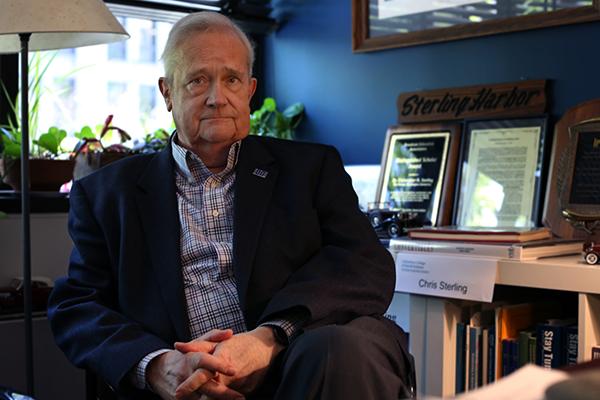After spending more than 30 years at GW, a School of Media and Public Affairs professor will retire this summer.
Christopher Sterling filled several roles at GW, including serving as an associate dean in the Columbian College of Arts and Sciences and professor emeritus of media and public affairs. He will retire on July 1 after working on several key projects, including construction on the Science and Engineering Hall and the Corcoran School of the Arts and Design merger.
“The University, in my mind, has improved so much as a research base and as a serious university with ever higher quality students,” he said “We’re more selective. It’s a more exciting place.”
Sterling joined the faculty in 1982 to direct the center for telecommunication studies. In 2001, he took on the position as the director of the telecommunication graduate program again until the program ended in 2005.
“When I came to GW, they actually came after me,” he said. “I came here because my field was media and telecommunication history and policy. It would have been silly not to take an academic place in the city.”
Sterling, who was the CCAS associate dean for graduate affairs from 1994 to 2001, said that when he was younger, he never thought that he’d pursue a doctorate degree, be an administrator or work in academia.
“It was kind of tough to study about something that nobody cared about,” Sterling said. “I said ‘I swear I don’t want to go into academia, I don’t want to go into to administration.’ I never thought I’d be in all three.”
During his career, Sterling authored or edited more than 25 books, including encyclopedias, textbooks and scholarly journals. Sterling received the Distinguished Education Service Award from the Broadcast Education Association in 1992 and the Distinguished Scholarship Award from the same organization in 2005.
The Manheim-Sterling Undergraduate Research Prize, an award given to two outstanding SMPA undergraduate students to do research with an SMPA faculty member, was also named after him.
In 2010, Sterling said he almost retired from his faculty position when CCAS offered to buyout several senior faculty members.
Peg Barratt, a psychology professor and the former dean of CCAS, said that she “scooped” Sterling out of retirement to become an associate dean. Barratt said although she barely knew Sterling before he came to work in the dean’s office, she had heard of his reputation as an engaged and productive faculty member.
“We thought it would be very helpful to have someone who was comfortable with an undefined position and knew GW well,” she said. “I think he’s very straightforward, and I value that a lot. He’s very respectful.”
Barratt said Sterling’s inside knowledge on multiple University projects, including the GW Museum, the Confucius Institute, the Science and Engineering Hall and the acquisition of the Corcoran School of the Arts and Design, gave him a level of expertise that was perfect for the position.
“I’m sure that even after he retires, he’s going to get a phone call or two because he has so much institutional knowledge,” Barratt said.
Kerric Harvey, a professor of media and public affairs who worked with Sterling when he was the director of the telecommunication program, said he will be remembered 30 years from now for his vast knowledge and “incredible enthusiasm for detail.”
“His legacy will be in big things and small things,” Harvey said. “His remarkable ability in the classroom. He’ll be remembered for his bridge-building abilities.”







